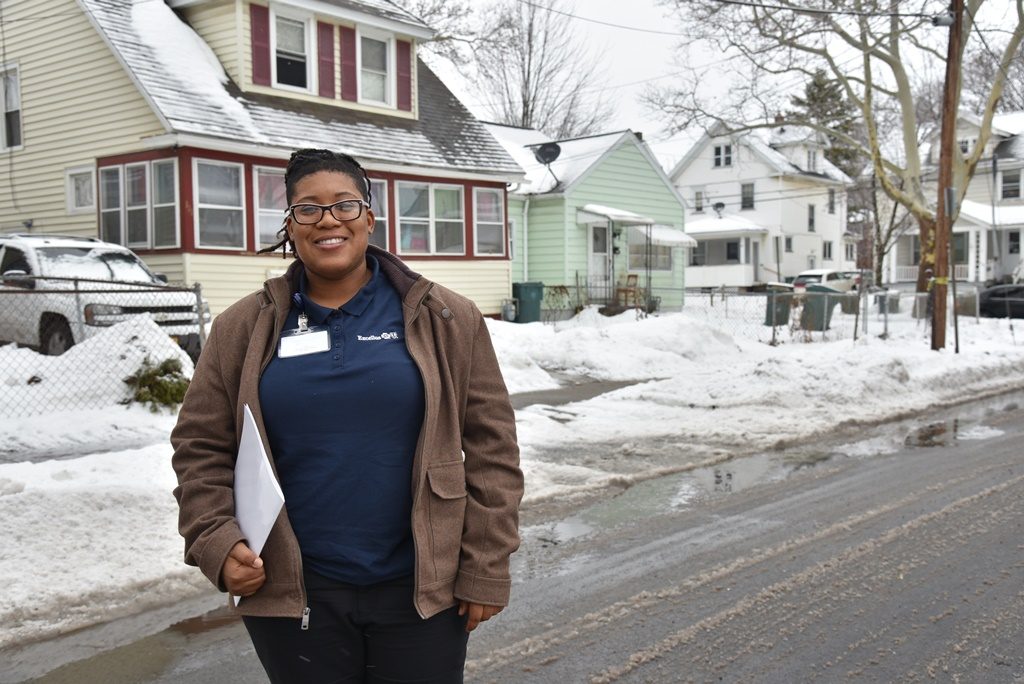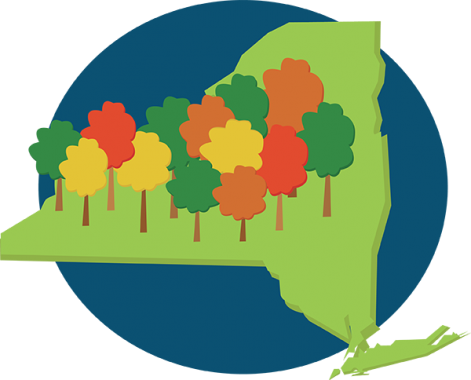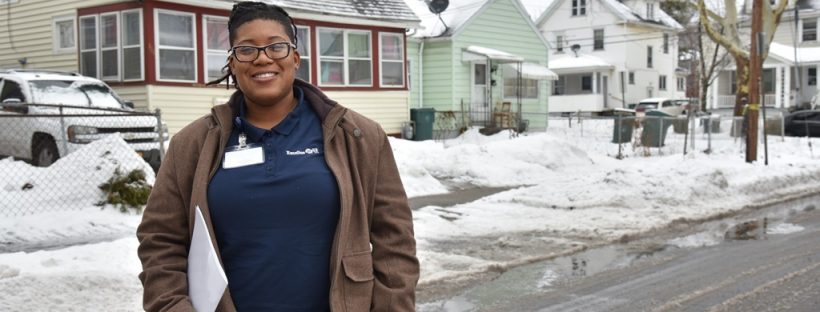Dajia Richardson parked her truck outside a house in a suburb of Rochester, N.Y.
She peered at the freshly-fallen snow on the driveway. No car. No footprints. “I’m still hopeful that someone is inside,” said Richardson, as she got out of the truck.
She trudged through the snow and knocked on the front door. Unlike some of her other visits this February morning, the man she was looking for opened the door.
Knocking On Members’ Doors
Richardson is part of the Safety Net CARE team at Excellus BlueCross BlueShield in upstate New York. CARE stands for Committed and Accountable to Relentless Engagement.
Richardson supervises the Community Connections team. These employees try to find hard-to-reach and medically-fragile Medicaid members and connect them back to the Health Plan.
If a care manager is unable to reach a Medicaid member, for example, the employees will look for members wherever they may be – at home, living under a bridge or at a friend’s house. The team, for example, connected almost 600 Medicaid members back to the Health Plan in the fourth quarter of 2018.
On this February morning, the member who answered the door struggled with high blood pressure. A nurse care manager kept calling him, but he wasn’t answering her calls.
That’s why he had an unannounced visit that morning from Richardson. The two talked for a few minutes. Then he invited her inside.
Another Nurse To Care About You
Richardson’s team of six employees look for Medicaid members daily. They look for Excellus BCBS members who live within eight counties of upstate New York: Broome, Erie, Livingston, Monroe, Oneida, Ontario, Otsego, and Wayne counties.
The employees have discovered that a personal visit may do more than an official letter or phone call to encourage Medicaid members to:
- take advantage of community resources
- talk to a care manager and enroll in a health-improvement program. Care managers help members with medical conditions, including pregnancies, diabetes and behavioral health issues.
The member with the high blood pressure, for example, told Richardson that he didn’t answer the care manager calls because he didn’t recognize the number. His girlfriend was also a nurse, he said, so he didn’t need to work with another one.

Dajia Richardson of Excellus BlueCross BlueShield
“It’s sometimes a little bit different when you have someone who works as a nurse and you know them personally, as opposed to a nurse care manager specifically for you and your care,” Richardson told the member. “When I put it to him that way, that he would have another nurse to care about him, he was definitely interested,” Richardson added.
By the time Richardson left his house, the member was on the phone talking to the nurse care manager at the Health Plan.
Looking Under Bridges
The hardest members to find are often those who are homeless. “We look for those bread crumbs that tell us where the member may be,” Richardson said.
Community Connections representatives, for example, traced one member with behavioral health issues to his parent’s house. They learned the member was living under a bridge. The parents shared details about the member. He was in his 20s, with a blonde ponytail and a scooter. After several trips to the bridge, Community Connections representatives found him and connected him to a care manager.
Click on the video below to learn about Richardson’s favorite success story – a member who needed help with her health and with other issues, including an eviction.
“We’ve Got the Goods”
Richardson and her team often go above and beyond to help members with other parts of their life.
On a day in January, for example, Richardson started her morning at the Angel Care ministry in a suburb of Rochester. The ministry helps financially-strapped moms acquire portable baby beds and other items.
“We’ve got the goods,” Richardson joked as she left the ministry with a pack n’ play and other baby items for a Medicaid member. She loaded the items in her vehicle. She then headed to the member’s home in the inner city of Rochester.
Community Connections representatives have cultivated contacts in the community – churches, government agencies, nonprofits, etc. – who can help employees secure items such as:
- Special formula for premature babies
- Help with an eviction
- Government-subsidized cell phones
- Beds for a family sleeping on wood pallets
- Car seats for newborns
For the member receiving the pack n’ play, a care manager had learned that the new mom didn’t have a safe place for her newborn to sleep. That’s why Richardson trekked to the ministry that morning.
“A lot of moms plan to sleep with their baby in their beds, with no plans after that,” said Richardson, as she turned her car out of the ministry’s driveway. “That’s where we can help.”
Chris Booth, CEO of Excellus BCBS, said the work of employees with Community Connections – and many others at the Health Plan – get at the heart of the company’s mission as a nonprofit health plan.
“The reason our Health Plan exists is to make sure as many people as possible have access to high quality, affordable health care,” he said. “We have a lot to be proud of, given all the work we do in our communities and especially with our Medicaid members.”
- Sepsis: A deadly condition that happens fast - January 17, 2020
- Knocking on doors. Looking under bridges. How we find hard-to-reach members. - March 25, 2019
- Flavorful Escarole and Pastina Soup - December 1, 2018



Are you looking for more people to do this job in Rochester?